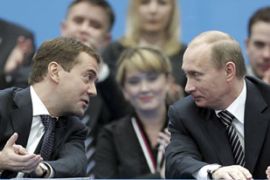Putin accepts key party position
United Russia approves outgoing president as chairman after unanimous vote.

Retaining power
Al Jazeera’s Jonah Hull in Moscow said that the announcement was not unexpected.
It changed its rules to allow the outgoing president to take the post of party chairman without actually becoming a member of United Russia.
Some analysts see a leadership role in United Russia as a way for Putin to preserve long-term influence by moulding the party, closely tied to the Kremlin since its creation, into a powerful political force in its own right.
Putin supporters
“Here one can clearly see the struggle of Kremlin groups that would like to keep Putin in power under any pretext and are looking for a way to do it,” Alexander Konovalov, a political analyst, told the Nezavisimaya Gazeta newspaper.
“They were unable to force the president to violate the constitution and serve a third term. Now they are trying other options.”
While the president can sack the prime minister he would have to seek the approval of parliament, which dominated by United Russia with two-thirds of the seats, to appoint a new premier.
Earlier, Medvedev said that he would not join the party as the president should be independent. He said he supported Putin’s decision and pledged to work with him.
“Analysts and those in the media are still trying to figure out whose portrait will end up hanging in government offices across the country,” Konstantin Sonin, a political commentator, wrote in the Moscow Times.
Libya visit
In a separate development, the Kremlin has announced that Putin will travel to Libya on Wednesday for a two-day trip, one of his last before stepping down.
Russian investment in Libya’s gas and nuclear energy sectors is likely to be on the agenda as Moscow seeks to boost ties with the North African state that is emerging from 20 years of diplomatic and economic isolation.
Arms sales to Tripoli and the clearing of Soviet-era debt may also be touched on in talks between the two leaders.